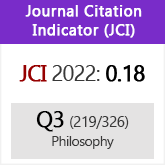Los sentimientos morales de la «tristeza» china. Una ilustración del acercamiento del Metalenguaje Semántico Natural (MSN) al análisis de algunas emociones chinas «básicas»
DOI:
https://doi.org/10.3989/isegoria.2001.i25.590Abstract
This study undertakes, under the framework of Natural Semantic Metlanguage (NSM) developed by Anna Wierzbicka and colleagues, a detailed contrastive and comparative semantic analysis of a pair of emotions concepts: bei and ai (often glossed interchangeably as sadness, sorrow, and grief), which are considered to be basic emotions in traditional Chinese philosophical texts. It illustrates that (a) they are by no means interchangeable, nor are they equivalent of the Western idea of sadness, (b) they are artifacts of the Chinese culture, shaped by Chinese people’s social and moral experiences, and their view of life and the universe. Essentially, bei encompasses a fatalistic view, and ai is a moral emotion. This leads the author to challenge the claims of universality based on the view entrenched in the English language, and urges researchers to pay attention to the analytical framework employed in the search for universal aspects of human emotions.
Downloads
Download data is not yet available.
Downloads
Published
2001-12-30
How to Cite
Ye, Z. (2001). Los sentimientos morales de la «tristeza» china. Una ilustración del acercamiento del Metalenguaje Semántico Natural (MSN) al análisis de algunas emociones chinas «básicas». Isegoría, (25), 201–221. https://doi.org/10.3989/isegoria.2001.i25.590
Issue
Section
Notes and Discussions
License
Copyright (c) 2001 Consejo Superior de Investigaciones Científicas (CSIC)

This work is licensed under a Creative Commons Attribution 4.0 International License.
© CSIC. Manuscripts published in both the printed and online versions of this Journal are the property of Consejo Superior de Investigaciones Científicas, and quoting this source is a requirement for any partial or full reproduction.All contents of this electronic edition, except where otherwise noted, are distributed under a “Creative Commons Attribution 4.0 International” (CC BY 4.0) License. You may read here the basic information and the legal text of the license. The indication of the CC BY 4.0 License must be expressly stated in this way when necessary.
Self-archiving in repositories, personal webpages or similar, of any version other than the published by the Editor, is not allowed.














